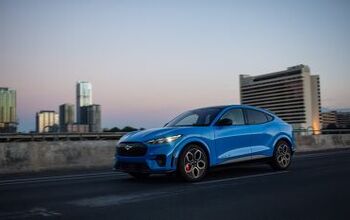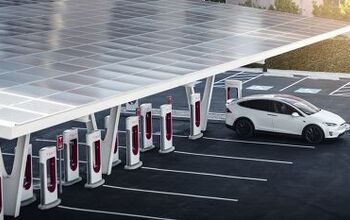Ford Seeking Group of Ranger Owners With Extremely Dangerous Trucks

Some 2,900 Ford Ranger pickups from the 2006 model year pose such a high risk to their owners, Ford Motor Company wants those people to stop driving them immediately. So great is the concern, Ford is recalling vehicles already named in an earlier recall, just so it can identify who the owners are.
Of the 21 deaths and hundreds of injuries reported from exploding Takata airbags, only two fatalities occurred in vehicles not built by Honda. A Ranger airbag explosion in 2015 killed a female driver. Now, the automaker claims it has discovered the July 2017 death of a West Virginia driver was also the result of a Takata inflator — and that both victims’ inflators were manufactured on the same day.
In 2016, Ford recalled 391,000 2004-2006 Rangers to remove potentially deadly Takata airbag inflators. Of that group, the new recall affects 2,700 2006 Rangers in the U.S. and 200 in Canada. Given the age of the vehicles, it’s likely many have gone to the crusher or scrapyard. Still, extreme danger exists in those still left on the road.
Takata inflators, composed of volatile ammonium nitrate (the same material used in truck bombs), can degrade over the passage of time, leading to instability. The inflator can then detonate with too much force in the event of an accident, sending metal shrapnel into the face and torso of the victim. High heat and humidity are known to speed up the chemical’s breakdown.
These 2,900 vehicles represent the model’s highest risk pool. The situation is similar to an urgent notice sent out in 2016 for a group of 2001-2003 Honda vehicles, all of which were determined to have a 50-percent chance of airbag detonation.
Meanwhile, Mazda said Thursday it would conduct its own recall of 2006 B-Series trucks containing the same inflator.
“It is extremely important that all high-risk air bags are tracked down and replaced immediately,” National Highway Traffic Safety Administration spokeswoman Karen Aldana said in a statement.
Ford says it will tow any impacted owner’s vehicle to a dealer to fix the issue, or send a mobile team to the owner’s home for on-site repairs. Free loaners can be had, if needed.
The Takata scandal led to the largest automotive safety recall in history and forced the company to file for bankruptcy protection last year (as well as pay $1 billion in penalties). Some 25 million vehicles will be recalled worldwide by 2019, more than 60 million of them in the United States.
[Image: Ford Motor Company]

More by Steph Willems
Latest Car Reviews
Read moreLatest Product Reviews
Read moreRecent Comments
- Probert They already have hybrids, but these won't ever be them as they are built on the modular E-GMP skateboard.
- Justin You guys still looking for that sportbak? I just saw one on the Facebook marketplace in Arizona
- 28-Cars-Later I cannot remember what happens now, but there are whiteblocks in this period which develop a "tick" like sound which indicates they are toast (maybe head gasket?). Ten or so years ago I looked at an '03 or '04 S60 (I forget why) and I brought my Volvo indy along to tell me if it was worth my time - it ticked and that's when I learned this. This XC90 is probably worth about $300 as it sits, not kidding, and it will cost you conservatively $2500 for an engine swap (all the ones I see on car-part.com have north of 130K miles starting at $1,100 and that's not including freight to a shop, shop labor, other internals to do such as timing belt while engine out etc).
- 28-Cars-Later Ford reported it lost $132,000 for each of its 10,000 electric vehicles sold in the first quarter of 2024, according to CNN. The sales were down 20 percent from the first quarter of 2023 and would “drag down earnings for the company overall.”The losses include “hundreds of millions being spent on research and development of the next generation of EVs for Ford. Those investments are years away from paying off.” [if they ever are recouped] Ford is the only major carmaker breaking out EV numbers by themselves. But other marques likely suffer similar losses. https://www.zerohedge.com/political/fords-120000-loss-vehicle-shows-california-ev-goals-are-impossible Given these facts, how did Tesla ever produce anything in volume let alone profit?
- AZFelix Let's forego all of this dilly-dallying with autonomous cars and cut right to the chase and the only real solution.


































Comments
Join the conversation
Ford is handling the whole airbag recall terribly. I have a 2008 Fusion - I just got ANOTHER letter from Ford telling me my car is subject to the airbag recall - but this one went on to tell me to not let anyone ride in the front passenger seat until the airbag gets replaced. And when will that happen? Ford doesn't know. I contacted Ford about this asking for a loaner or SOMETHING - and they have no plans in place. The dealer's hands are tied by Ford. What do you do if you have to carry passengers every day? If you only have this one car? Put them all in danger?? Thanks Ford - for absolutely nothing.
I own a 2006 Ranger 2WD longbed. Both airbags were recalled in 2016 and both times (as they did it one at a time) it took an awfully long time between receiving the recall notice and the replacement parts being available. I hope I don't get a new recall notice telling me not to have any passenger sit in the front row, because the front row is all I have (single cab). Hey Ford, instead of a loaner why not give us a 2019 Ranger for free to replace this deathtrap to prove your goodwill ? :)